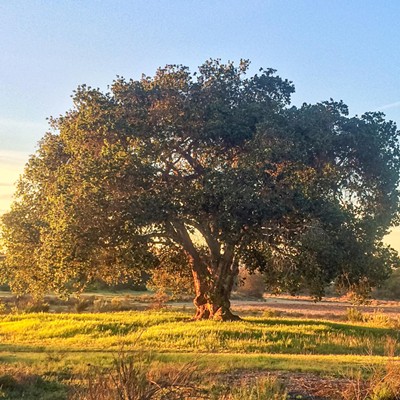After months of negotiations, failed drafts, and a prolonged stalemate, Congress finally passed a farm bill this month, one that will almost certainly be signed into law by President Trump before the new year.
The U.S. House of Representatives approved the $867 billion bill with a 386-47 vote on Dec. 11, a day after it passed the Senate 87-13. It was a massive vote of support from both sides of the aisle, a move that Rep. Salud Carbajal (D-Santa Barbara) said will return some much needed stability to the lives of California farmers, who are facing a wide spectrum of issues caused by an ongoing trade war, incessant wildfires, and a worsening labor shortage.
"This bill provides certainty and stability of funding and programs for agriculture in our country and on the Central Coast," Carbajal told the Sun.
The farm bill, which acts as the federal government's primary nutrition and agricultural policy-making tool, is updated by Congress every five years.
This year's bill would maintain and enhance funding for specialty crop research, marketing, and insurance, Carbajal said. If signed by President Trump, California cut flower and hemp growers would be eligible for crop insurance for the first time, and Carbajal said there would be slight increases in automation and mechanization research funding, along with a boost in funding for food banks and farmers markets.

Those were all key issues highlighted by Central Coast farmers at a listening session Carbajal hosted in February at the Santa Maria Fairpark. There, he and Rep. Collin Peterson (D-Minnesota) heard what locals hoped to see prioritized in the then still developing bill, and dozens of residents affiliated with the agricultural industries in Santa Barbara and San Luis Obispo counties discussed the importance of specialty crop research, crop insurance, disaster relief, and California's farm labor shortage.
The issues are even more pressing now, Carbajal said, especially for the area's berry and wine grape farmers, who are most affected the Trump administration's trade war with China.
"I'm happy to report that all those programs will continue at same level or slightly enhanced level from the previous bill," Carbajal said.
It's a "status quo" bill that would do little to reform the nation's policies regarding agricultural research, forestry, and nutrition, and it would do almost nothing to improve the labor pool for California farmers. Still, Carbajal called the compromise bill a "huge win," considering the many attempts made by some members of Congress to slash funding for food assistance and conservation programs.
In May, the House voted down another draft of the farm bill that would have cut $24 billion from the U.S. Department of Agriculture's Supplemental Nutrition Assistance Program (SNAP), which provides food assistance to a little more than 16,000 low-income families on the Central Coast. The 2018 farm bill also would have expanded and modified SNAP's work and eligibility requirements.
Another proposed farm bill would have also significantly rolled back logging restrictions in national forests, according to Rebecca August, a public lands advocate with Los Padres ForestWatch.
Los Padres ForestWatch, a coalition of local and state organizations dedicated to preserving Los Padres National Forest and other public lands on the Central Coast, launched a campaign against the farm bills proposed earlier this year and the provisions in it that August said would have made it easier to expand commercial logging in Los Padres.
The provisions would have fast-tracked landscape-scale logging projects of up to 10 square miles in size, enabling tens of thousands of acres of national forests to be logged, August said. It would have permitted bulldozing new roads up to 3 miles long in roadless areas, and would have removed restrictions on aerial spraying of herbicides, all moves that August said would have been harmful to national forests.
"It's just a bummer that [these provisions were] in a bill that is supposed to help farmers and people," August said. "It was sad to see it used politically in that place, in something that really helps people when it's done correctly."
But after hundreds of residents throughout the Central Coast contacted their members of Congress to voice opposition to the rollbacks, August said they were removed from the final bill, and not included in the draft that recently passed. The passed draft would also restore billions in funding to SNAP and conservation programs.
"All these bad things didn't get in," August said, "so that was really great."
Local agricultural organizations also appear to be generally pleased with the final bill.
Carolyn O'Donnell, communications director for the California Strawberry Commission, said the organization was happy to see small spikes in funding for specialty crop research, including additional money for pest control and mechanization research. Strawberries are a labor intensive crop, and O'Donnell said with skilled workers becoming increasingly difficult to find, the industry is hoping to find ways to harvest with the help of automation.
Western Growers President and CEO Tom Nassif echoed those sentiments in a statement released on Dec. 11, but said he was disappointed in the final bill's failure to reconcile the Federal Insecticide, Fungicide, and Rodenticide Act with the Endangered Species Act, which he said remains a long-standing issue.
Tim Cansler, a federal advocate for the California Agricultural Commissioners and Sealers Association, said that while this bill was largely status quo, it also included many new non-traditional programs that attracted support from members who otherwise might have not have supported it.
Some of the provisions established permanent baseline funding for some non-traditional forms of agriculture, such as organic crops; locally or regionally produced agricultural foods; urban, indoor and other emerging agricultural production; and the legalization of industrial hemp production.
That all led to a landslide vote, Cansler wrote in an email to the Sun.
"It was the largest vote of support for a farm bill in history," he said.
Staff Writer Kasey Bubnash can be reached at [email protected].









